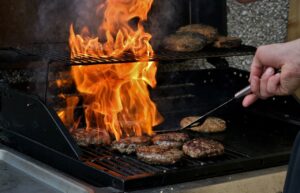Gas grills have become a popular choice among outdoor cooking enthusiasts due to their convenience and ease of use.
While traditional stainless steel or cast iron grills dominate the market, some people wonder if copper can be used as an alternative material for a gas grill.
In this article, we will delve into the pros and cons of using copper for a gas grill, giving you the necessary insights to make an informed decision.
Pros of Using Copper for a Gas Grill:
- Excellent Heat Conductivity: Copper is known for its exceptional heat conductivity. It can quickly distribute heat evenly across the cooking surface, resulting in more uniform cooking and better grilling performance.
- Stunning Aesthetic Appeal: Copper offers a unique and eye-catching appearance that adds a touch of elegance to any outdoor cooking area. Its warm, reddish-brown hue develops a natural patina over time, lending it a rustic charm.
- Corrosion Resistance: Copper is highly resistant to corrosion, making it a durable choice for outdoor use. It can withstand exposure to various weather conditions, such as rain, snow, and sunlight, without losing its functional or aesthetic qualities.
- Antibacterial Properties: Copper possesses natural antibacterial properties, which can help inhibit the growth of harmful bacteria on the grill surface. This feature can be particularly beneficial when cooking meats or other perishable foods.
Cons of Using Copper for a Gas Grill:
- Price: Copper is generally more expensive than other materials commonly used for gas grills, such as stainless steel or cast iron. The higher cost might be a deterrent for budget-conscious individuals.
- Prone to Scratches: Copper can be relatively soft compared to other metals, making it susceptible to scratches and dents. While these cosmetic flaws might not affect the grill’s performance, they can impact its overall appearance.
- Maintenance: Copper requires regular maintenance to retain its shine and prevent the formation of patina, which some may find inconvenient. Polishing and cleaning are necessary to keep the grill looking its best.
- Reactivity with Acidic Foods: Copper can react with acidic foods, altering their taste and potentially causing health concerns. This reactivity can be mitigated by using a protective coating on the cooking surface or opting for copper-clad grills.
Popular Gas Grill Materials and Their Benefits
Here are some popular gas grill materials and their unique advantages:
| Material | Benefits |
|---|---|
| Stainless Steel | Durable, easy to clean, rust-resistant |
| Cast Iron | Excellent heat retention, ideal for searing |
| Aluminum | Lightweight, corrosion-resistant |
| Ceramic | Superior heat retention, even cooking |
Conclusion:
While copper offers several enticing benefits for a gas grill, such as excellent heat conductivity and aesthetic appeal, it also comes with drawbacks like higher cost and maintenance requirements.
Remember to consider alternative materials like stainless steel, cast iron, aluminum, or ceramic, each with its own advantages. Happy grilling!
Note: Ensure to conduct thorough research and consult with experts before making any purchasing decisions.
